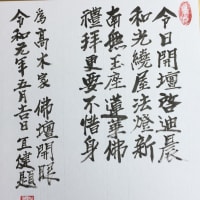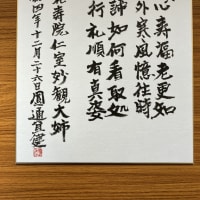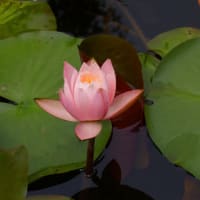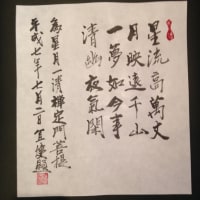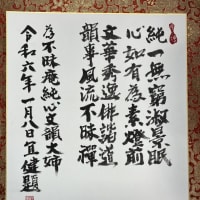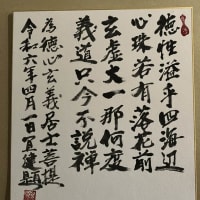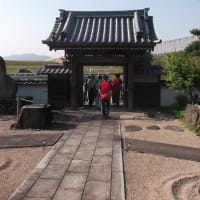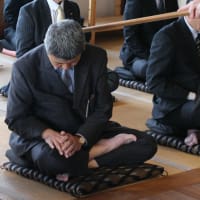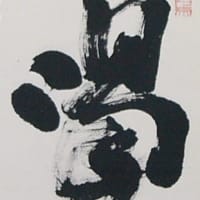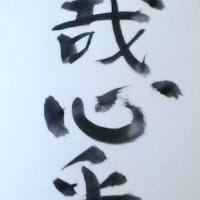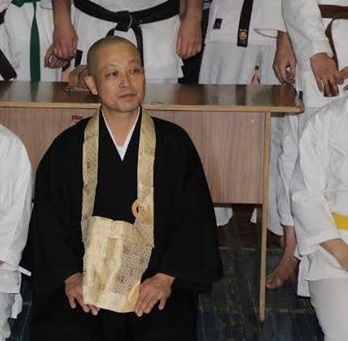The fifth lecture. One who commits his heart and soul to emptiness.
48) In May, the season of fresh green every single year. I recall the famous verse.
‘The green leave for eyes, the mountain little cuckoo, the first bonito fish in early summer.’
Japanese people should be able to fully understand it without explanation.
And then, I recall another one in addition.
‘What a sweet smell of adhered indigo to my palm in a seasonal change of clothing.’
This verse is the best expression of a new refreshing feeling of seasonal change of clothing.
49) No matter what our job when working with all our might, we are unaware of the passage of time. We feel an hour or two hours as five or ten minutes. However, it was not that an hour became five minutes. By transcending time, we feel that. It seems to exist but nothing.
50) Scarcely need saying, ‘The green leave for eyes‘ means the world of eyes. It is the world of being reflected in the eyes. And the subject is the world of form as the green leave for eyes. Our eyes noticed the world of form as the green leaves by way of an eyeball and became aware of it. Our eyes noticed, ‘it became wholly new greenery.’
But if saying, I want to go play somewhere. It is not the eye area.
“Zoitsu Agon Sutra” teaches that our eyes eat form, and our ears eat voice. The food of eyes is formed. The food of ears is voice. With for beautiful scenery. That is rejoicing of eyes. Desire a good voice, that rejoices of ears.
51) Buddhists offer up incense when attending a funeral. It comes from the that ‘All beings eat incense after they’re passing away. Therefore, we need food not only for the mouth but also eyes, ears, and nose.
52) Everything is related together as an interdependence. Mutual relationships are important not only for humans but also for everything in the world. Therefore, it is not a taking-and-taking, is a relation of a give-and-take. We should understand giving life and receiving life simultaneously. That means the relationship between Karma and interdependence.
53) Moreover, everything does not only exist in give-and-take, but everything is passing, moving, like a river. We cannot wash our legs with water from the same river. The water of the river continues to flow. The water used to wash my feet is irreversible. Not just the water of the river, we are constantly changing. My existence yesterday does not exist today.
54) I cannot live without society. My life is not just for me merely. We are keenly aware of the blessings of society when we fully understand we are maintained and nurtured by all. Well, we have to feel that way.
55) Now that my physiognomy means social aspect and the social aspect means my physiognomy, our feeling of gratitude to the world and people are gushing out from the bottom of our minds. We cannot but say it is out of the question that one who makes a curse another one and has a grudge the society immoderately by nothing confession.
56) One who realizes the learning of Karma once and committed himself to the emptiness of Hannya can understand fleeting life and precious life simultaneously. In fact, for a fleeting reason, our lives are precious.
That is ‘I feel joy in cherry blossoms because of scattering’. There is flower life due to scattering. We have a precious life and gratitude for life.
57) Just one thousand five hundred years ago, there was a young Buddhist scholar, named Shojyo in China. He was the best scholar among three thousand disciples. But owing the incident, aroused the king’s anger, and he just got the death penalty at that time. He begged to be alive for seven days strangely. He completely wrote, “The Hozoron; The theory of owned Dharma” in the prison during those days. He was thirty-one years old.
58) It is said, there are lots of ways. However, there is only one way you have to do it. Taking this lecture on the Hannyashin sutra opportunity, learning the path of Hannya truly, I think to work steadily just one path.












